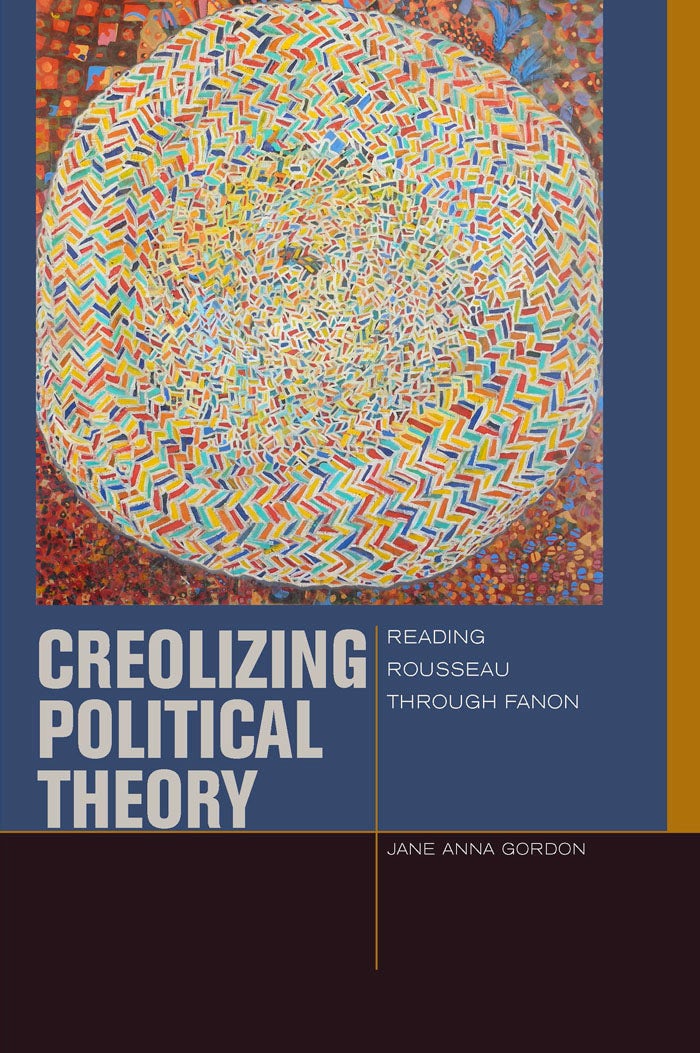Jane Anna Gordon: Creolizing Political Theory: Reading Rousseau through Fanon (2014)
Filed under book | Tags: · black people, colonialism, creolization, decolonization, freedom, governance, law, modernity, political theory, politics, power, race, theory

“Might creolization offer political theory an approach that would better reflect the heterogeneity of political life? After all, it describes mixtures that were not supposed to have emerged in the plantation societies of the Caribbean but did so through their capacity to exemplify living culture, thought, and political practice. Similar processes continue today, when people who once were strangers find themselves unequal co-occupants of new political locations they both seek to call “home.”
Unlike multiculturalism, in which different cultures are thought to co-exist relatively separately, creolization describes how people reinterpret themselves through interaction with one another. While indebted to comparative political theory, Gordon offers a critique of comparison by demonstrating the generative capacity of creolizing methodologies. She does so by bringing together the eighteenth-century revolutionary Swiss thinker Jean-Jacques Rousseau and the twentieth-century Martinican-born Algerian liberationist Frantz Fanon. While both provocatively challenged whether we can study the world in ways that do not duplicate the prejudices that sustain its inequalities, Fanon, she argues, outlined a vision of how to bring into being the democratically legitimate alternatives that Rousseau mainly imagined.”
Publisher Fordham University Press, New York, 2014
Just Ideas series
ISBN 9780823254811, 082325481X
xv+294 pages
Reviews: Anne Norton, Sharon Stanley, Fred Lee, Thomas Meagher (with author’s response, Contemporary Political Theory, 2018).
See also: Forum on Creolizing Theory (ed. Lewis R. Gordon, Journal of French and Francophone Philosophy, 2017), The Creolization of Education, Pedagogy, and Political Theory (ed. Lewis R. Gordon, Review of Education, Pedagogy, and Cultural Studies, 2018).
October, 174: A Questionnaire on Decolonization (2020)
Filed under survey | Tags: · activism, art, black people, collecting, colonialism, decoloniality, decolonization, eurocentrism, history, imperialism, indigenous peoples, land, museum, postcolonialism, race, slavery, violence
“The term decolonize has gained a new life in recent art activism, as a radical challenge to the Eurocentrism of museums (in light of Native, Indigenous, and other epistemological perspectives) as well as in the museum’s structural relation to violence (either in its ties to oligarchic trustees or to corporations engaged in the business of war or environmental depredation). In calling forth the mid-twentieth-century period of decolonization as its historical point of reference, the word’s emphatic return is rhetorically powerful, and it corresponds to a parallel interest among scholars in a plural field of postcolonial or global modernisms. The exhortation to decolonize, however, is not uncontroversial-some believe it still carries a Eurocentric bias. Indeed, it has been proposed that, for the West, de-imperialization is perhaps even more urgent than decolonization.
What does the term decolonize mean to you in your work in activism, criticism, art, and/or scholarship? Why has it come to play such an urgent role in the neoliberal West? How can we link it historically with the political history of decolonization, and how does it work to translate postcolonial theory into a critique of the neocolonial contemporary art world?”
Respondents include Nana Adusei-Poku, Brook Andrew, Sampada Aranke, Ian Bethell-Bennett, Kader Attia, Andrea Carlson, Elise Y. Chagas, ISUMA, Iftikhar Dadi, Janet Dees, Nitasha Dhillon, Hannah Feldman, Josh T. Franco, David Garneau, Renee Green, Iman Issa, Arnold J. Kemp, Thomas Lax, Nancy Luxon, Nelson Maldonado-Torres, Saloni Mathur, Tiona Nekkia McClodden, Alan Michelson, Partha Mitter, Isabela Muci Barradas, Steven Nelson, Ugochukwu-Smooth C. Nzewi, Alessandro Petti, Paulina Pineda, Christopher Pinney, Elizabeth Povinelli, Ryan Rice, Andrew Ross, Paul Chaat Smith, Nancy Spector, Francoise Verges, Rocio Zambrana, and Joseph R. Zordan.
Edited by Huey Copeland, Hal Foster, David Joselit, and Pamela M. Lee
Publisher MIT Press, Fall 2020
Open access
ISSN 0162-2870
123 pages
Diana Taylor: ¡Presente! The Politics of Presence (2020)
Filed under book | Tags: · affect, decolonization, disappearance, gesture, knowledge, latin america, performance, performance art, politics, presence, violence, zapatistas

“In ¡Presente! Diana Taylor asks what it means to be physically and politically present in situations where it seems that nothing can be done. As much an act, a word, an attitude, a theoretical intervention, and a performance pedagogy, Taylor maps ¡presente! at work in scenarios ranging from conquest, through colonial enactments and resistance movements, to present moments of capitalist extractivism and forced migration in the Americas. ¡Presente!—present among, with, and to; a walking and talking with others; an ontological and epistemic reflection on presence and subjectivity as participatory and relational, founded on mutual recognition—requires rethinking and unlearning in ways that challenge colonial epistemologies. Showing how knowledge is not something to be harvested but a process of being, knowing, and acting with others, Taylor models a way for scholarship to be present in political struggles.”
Publisher Duke University Press, Durham, NC, 2020
Dissident Acts series
ISBN 9781478009443, 1478009446
xii+329 pages
PDF (31 MB, updated on 2021-4-13)
Comment (0)
